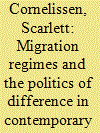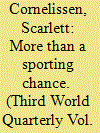|
|
|
Sort Order |
|
|
|
Items / Page
|
|
|
|
|
|
|
| Srl | Item |
| 1 |
ID:
089139


|
|
|
|
|
| Publication |
2009.
|
| Summary/Abstract |
The issue of migration and in particular the increase in irregular or undocumented migration has become highly politicised in Southern Africa. This has involved a rise in social intolerance towards migrant populations and outright xenophobia in many countries. This brief article examines the dynamics and complexities of migration in current-day Southern Africa and contextualises it in relation to the most salient issues, discourses and practices that characterise migration governance at the international level. The article highlights that predominant approaches to the governance of migration in the region reflect some of the dynamics which have marked migration discourse and praxis in the international sphere, but that they also carry some distinct characteristics. Trends of securitisation and related exclusionary practices of citizenship, which have become more pronounced in the international sphere, are emulated in Southern Africa. State and societal processes and reactions to higher levels of regional migration have created a context in which social polarisation and the entrenchment of difference prevails. This has meant that prime questions about how to ameliorate the socio-economic and political circumstances which evoke migrant flows in the first instance, and on how to deal with the inefficiencies in Southern Africa's current migration policies, have remained largely unasked by the region's rulers. Overall, Southern Africa's migration regime evidences two contradictory thrusts, one which seeks to encourage closer regional and specifically economic integration, and the other which resists the assumed threats posed to national sovereignty by increased migrant flows and which leads to a fractious regional governance system.
|
|
|
|
|
|
|
|
|
|
|
|
|
|
|
|
| 2 |
ID:
105408


|
|
|
|
|
| Publication |
2011.
|
| Summary/Abstract |
This article appraises the sport for development initiatives that were implemented or augmented during the 2010 fifa World Cup hosted in South Africa, and reviews the processes, institutional features and likely consequences of those initiatives for the sport for development sector in the country. It does so against the background that sport for development is a growth industry, albeit one with many conceptual and operational deficiencies, and which offers little in the way of an evidentiary base for the claim that sport has intrinsic social benefits. To date, too, there has been little cross-fertilisation between the sport for development field as a practice of development, and the growing body of scholarship that assesses the development impacts of large-scale sporting events. Given its distinctive setting and the intense international interest in its potential yields, the 2010 World Cup provoked a flurry of sport-centred development programmes implemented by a variety of international, domestic, public and private actors. This stimulated an interesting change in dynamics in the established sport for development landscape which, in time, may shape the sector and the broader sports environment in the country in both positive and negative ways. The case of the World Cup also offers some insights about the way in which sport for development practices can be mediated or altered in the context of sport mega-events.
|
|
|
|
|
|
|
|
|
|
|
|
|
|
|
|
| 3 |
ID:
155454


|
|
|
|
|
| Summary/Abstract |
How does nation branding reflect state–society relations and more pertinently, what does it reveal about the way political power is legitimated by a given state and why? This question seldom receives attention in the rapidly expanding scholarship on nation branding. This article examines and interprets national branding processes in post-apartheid South Africa within the context of larger efforts by political elites to legitimate the new state and society and to address some of the complex legacies of the apartheid past. These efforts targeted domestic and international audiences in distinctive ways, intertwined foreign and nation-building policies, and sought to communicate key ideas about South Africa as state and nation and about the state’s role in the wider world order. The article considers how different groups of state-linked actors participated in exercises of legitimation and the discursive mechanisms that were relied on. Three such mechanisms are highlighted: (i) the construction of a distinct African-style modernity (here termed Afro-modernity); (ii) claims of South African exceptionalism articulated in boosterist branding campaigns; and (iii) expressed, variously through foreign policy signals, diplomatic posturing and hallmark events, the projection of a national role conception as leader on the African continent and of the Global South. These compound political processes had ambivalent and incomplete outcomes, however. This article considers why and what the implications are for the South African state and its society.
|
|
|
|
|
|
|
|
|
|
|
|
|
|
|
|
| 4 |
ID:
116282


|
|
|
|
|
| Publication |
2012.
|
| Summary/Abstract |
The Tokyo International Conference on African Development (TICAD), now in its fifth iteration, has significantly evolved both in its content and as a process. Over the years, successive conferences have placed emphasis on various aspects of African development, and there have also been attempts to make the conference and its spin-offs more inclusive. The fourth TICAD, held in 2008, signalled the most significant effort by the Japanese authorities to improve the effectiveness and impact of the TICAD process. This was against the background of Japan's continued economic troubles and increased domestic pressure to more efficiently use Japan's dwindling aid resources. As a result, while the product of deliberation with African stakeholders, the TICAD IV outcomes reflect many of Japan's domestic and strategic priorities. This essay takes stock of the principal outcomes of TICAD IV and their implications for Japan's economic cooperation with the Southern African region. It does so from the position that Japan's broad economic links with Southern Africa have followed a distinct pattern over the past 10 to 15 years. The essay reviews general tendencies in Japanese aid and investments to Southern Africa against the backdrop of developments in Japan's wider Africa policy. It discusses some of the prominent outflows of TICAD IV and concludes with an assessment of their implications for the subregion.
|
|
|
|
|
|
|
|
|
|
|
|
|
|
|
|
|
|
|
|
|